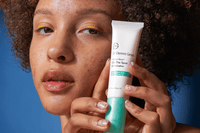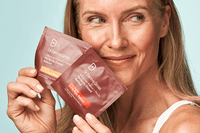Physical vs Chemical Sunscreen & Essential Sunscreen Tips
8 minutes

By now, you’ve heard enough to know that daily sunscreen application is a no-brainer. For starters, there are legitimate, verifiable health reasons: According to the American Academy of Dermatology (AAD), it’s estimated that one in five Americans will develop skin cancer during their lifetime. And skin cancer is an equal-opportunity cancer—anyone can get it, regardless of age, gender, or ethnicity.
But even if you’re feeling lucky and willing to take the health risk, there are also matters of premature skin aging to contend with. Chronic exposure to ultraviolet (UV) rays breaks down the collagen and elastin fibers that serve as the skin’s support structures, leading to wrinkles, sagging, and a loss of firmness. UV rays also trigger the formation of dark spots and other skin discoloration. So there’s that as well.
You have a plethora of choices when it comes to sunscreens, but it all boils down to one of two types: physical and chemical. Any sun protection you select is going to be one or the other (or a combination of both). Dermatologists recommend a daily broad-spectrum SPF of at least 30, but after that, the choice is yours. Physical sunscreens use minerals to block UV rays; chemical sunscreens use chemicals (surprise, surprise) to dissipate rays. But there’s (a lot) more to it than that.
Comparing Physical and Chemical Sunscreens
Physical sunscreens use minerals to shield skin. Specifically, two: zinc oxide and titanium dioxide. They get the term “physical” because they work by sitting on top of the skin as an inert layer that UV rays just bounce off of. Non-nano physical sunscreens don’t get absorbed by the body, so they’re there until you wash or sweat them off. (Note: You need to reapply physical sunscreens just as diligently as you do chemical ones.) Physical sunscreens are pretty basic, in terms of ingredients, which is especially excellent news if your skin is sensitive. These mineral-based blocks are less likely to trigger irritation or other adverse reactions.
Chemical sunscreens, on the other hand, sink into skin. When exposed to UV light, chemical sunscreens absorb the UV rays, covert them into heat, then release the heat into the atmosphere (and out of your skin). As compared to physical sunscreens, there’s a laundry list of chemicals that can work as UV absorbers. The most commonly used ones include oxybenzone, avobenzone, homosalate, and octocrylene.
What Does Dr. Dennis Gross Recommend?
“After reviewing the latest research, I recommend to my patients that they use a physical sunscreen, like my All-Physical Lightweight Wrinkle Defense Broad Spectrum Sunscreen SPF 30, every single day,” says our founder, Dennis Gross, MD. That’s because studies have demonstrated that sunscreen chemical get deeper into the body than previously thought. A recent follow-up study done by the U.S. Food and Drug Administration (FDA) and published in the Journal of the American Medical Association found that six active chemical sunscreen ingredients are absorbed into the bloodstream after a single application. While the FDA refrained from equating absorption with risk and stated that the results of its study didn’t indicate the ingredients were unsafe, there’s no denying that these ingredients are getting into core body areas – make of that what you will.
“Physical sunscreens used to be thick and heavy—think of a lifeguard’s nose coated in white zinc,” Dr. Gross says. “But now physical formulations are so light and transparent, there’s no longer a tradeoff between safe sun protection and something that’s cosmetically elegant enough to wear daily. For that reason and knowing what we now know, thanks to independent, peer-reviewed research, I no longer see any reason to promote chemical sunscreens to my patients. In fact, doing so almost seems irresponsible.”
Sunscreen Tips
What SPF Number Should You Use?
The AAD recommends a broad-spectrum sunscreen with an SPF of 30 or more for regular everyday use. Broad spectrum means it protects against UVA and UVB rays. You want to guard against both types because they actually do different things to the body. In a (highly simplified) nutshell: UVA rays are responsible for skin aging, and UVB rays are what cause skin burning. The SPF number correlates to the amount of UVB rays a product will neutralize. SPF 30 blocks 97 percent of the sun’s UVB rays. However, no product can negate UVB 100 percent, and you get diminishing returns as you increase your SPF level. SPF 50 blocks 98 percent of UVB rays, and SPF 100 blocks 99 percent of UVB. It’s not nothing, but it’s also not a free pass.
How to Apply Sunscreen
If you’re doing your entire face and body, you’ll need at least one ounce of lotion (the equivalent of a full shot glass) to do the job thoroughly. For times when only your face is exposed, it takes a nickel-size amount to cover the neck and above adequately. Apply your sun protection 15 to 30 minutes before you head outside, to give it enough time to bind to your skin. And don’t forget these commonly overlooked areas: the tops of your feet and ears; the backs of your neck and knees; the part in your hair; and the backs of your hands.
When to Reapply Sunscreen
After two hours outside, it’s time to repeat the SPF application process. If you’re swimming or sweating profusely, you need to reach for your sunscreen as soon as you dry off. (“Waterproof” is a myth; there’s no such thing when it comes to sunscreen.) And just because you’re using an SPF 100000 doesn’t mean you can wait longer between applications. You need to reapply your SPF 50 just as often as you do your SPF 30. Also worth noting: Sunscreen has a shelf life. If you apply as much and as frequently as dermatologists recommend, this won’t be an issue. But if you find a bottle of sunscreen in the back of your cabinet, check the expiration date (it’s usually printed on the container). If it’s past its prime, it’s time to toss—the contents of that old bottle aren’t going to offer you any UV protection.
Discover Dr. Dennis Gross Skincare for All Your Skincare Needs
For more skincare tips from the experts at Dr. Dennis Gross, check out our blog’s newest content today and learn more about expert sunscreen application. Shop the collection of Dr. Dennis Gross bestselling skincare backed by dermatologists.

Written By
Ben Gentzler
Ben Gentzler has worked in the beauty industry for 17 years — 10 of which were spent in clinical skincare. He is a licensed esthetician with a passion for leading professional education on cutting edge treatments at top spas around the world and for training on the science of skin. Ben has trained directly with Dr. Dennis Gross, learning about the state of the art in skincare and working with his clients to help them achieve their best skin.
Read More from Ben Gentzler
Written By
Ben Gentzler
Ben Gentzler has worked in the beauty industry for 17 years — 10 of which were spent in clinical skincare. He is a licensed esthetician with a passion for leading professional education on cutting edge treatments at top spas around the world and for training on the science of skin. Ben has trained directly with Dr. Dennis Gross, learning about the state of the art in skincare and working with his clients to help them achieve their best skin.
Read More from Ben GentzlerRelated Articles
-

acne, author-ben-gentzler, skin-and-deeper April 03, 2024 — 6 minutes
Hit It: Introducing The Dr. Dennis Gross Alpha Beta On The Spot Eliminator
by Ben Gentzler
-

author-ben-gentzler, myth-busting, oily-skin, skin-and-deeper April 01, 2024 — 9 minutes
Myth busted: Yes, your oily skin does need a moisturizer
by Ben Gentzler
-

author-ben-gentzler, pro-tips, retinol, skin-and-deeper March 25, 2024 — 5 minutes
How to Use Perfectly Dosed Retinol Pads Like a Pro
by Ben Gentzler
Keep Reading
Stay up to date on the latest advice from our team of skincare experts.
Sign up to receive a monthly digest of skincare, wellness, and lifestyle tips.






